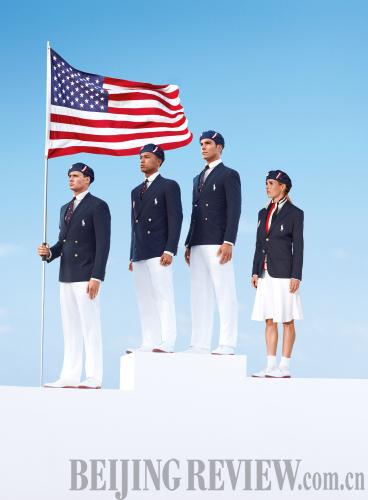|
 |
|
CONTROVERSIAL ATTIRE: Controversy over the U.S. Olympic team's made-in-China uniforms provides a telling example of China-bashing (CFP) |

In the run-up to the London Olympic Games, American fashion designer Ralph Lauren was caught off guard by public outcry that the U.S. team's uniforms had been manufactured in China. U.S. Olympic team uniforms have been made outside the country since 1998, so why the controversy now?
There are two reasons. First, from 1998 until 2008, a company called Roots manufactured the uniforms in Canada. Outsourcing to Canada was much less threatening than handing the order off to the cheap-labor alternative of America's economic rival China.
Second, it's an election year and outsourcing and unemployment are key issues on mind of every American.
Senate Majority Leader Harry Reid, a Democrat, said the U.S. Olympic Committee (USOC) should be "ashamed of themselves" and "embarrassed" because of the lost jobs that could have been created for the U.S. textile industry. Speaker of the House John Boehner, a Republican, said of the USOC, "You'd think they'd know better."
The truth is that one would think the politicians from both parties would know better about how the Olympics are funded.
"Unlike most Olympic teams around the world, the U.S. Olympic team is privately funded and we're grateful for the support of our sponsors," USOC spokesman Patrick Sandusky said.
Via Twitter, Sandusky called the outrage over the made-in-China uniforms "nonsense."
And Sandusky is right. The harsh rhetoric by the politicians, including a comment by Reid that the uniforms should be "put in a big pile and burned," does not help the U.S. economy and is counterproductive to fostering good relations with China.
China's official news agency, Xinhua, condemned Reid for his narrow nationalism and ignorance. China and the United States are crucial to each other's trade, with bilateral trade exceeding $440 billion last year, Xinhua reported.
"If the accusation is justified, why shouldn't the U.S. Congress impose a ban on its members, who politically represent the country, from wearing anything or using any product that is made abroad?" Xinhua said. "So, if there is anything that should be burned, it should really be the hypocrisy of the U.S. politics."
A case in point is that Nike, a U.S. giant in athletic apparel and sports gear, unveiled uniforms for China's Olympic team in June. Nike will outfit the basketball team and six other teams going to London. But there has not been an outcry from Chinese officials about that. It's just a matter of fact that Olympic teams are sponsored by overseas brands.
Accusing Ralph Lauren of being unpatriotic is disingenuous by the politicians. It was purely an economic decision as, according to a report released by the U.S. Bureau of Labor Statistics in 2011, though manufacturing workers in China are earning more than ever, the average hourly wage was only $1.36 in 2008, compared with $32.26 in the United States.
Ralph Lauren has promised that the uniforms for the U.S. Olympic team for the 2014 Winter Games will be made at home. To offset the labor costs of having the uniforms made on the homefront, a patriotic Olympic attire tax could be introduced, but taxes are an anathema for any Republican politician, so that's unlikely to pass.
Legislation has also been proposed in the Senate that would ensure all Olympic uniforms be made in the United States in the future.
The ultimate proof that outsourcing is more of an economic issue, not a patriotic one, is that the vast majority of U.S. flags are no longer made in America since demand for them soared after the September 11 attacks. According to The Christian Science Monitor, flag buyers weren't patriotic enough to pay the price to have made-in-the-United States flags.
What is also telling about the patriotic aspect is that the athletes themselves do not seem to care where their uniforms were made. In a tweet, Nick Symmonds, who will compete in the 800-meter run, wrote, "Our Ralph Lauren outfits for the Olympic opening ceremonies were made in China. So, um, thanks China."
The view of the "made in China" moniker is changing as it is increasingly being attached to products originating in China from U.S. companies and gaining more acceptance in the West.
The controversy over U.S. Olympic uniforms being made in China is yet another example of China-bashing. It will only harm U.S.-Sino relations. The bottom line is the uproar is unwarranted.
The author is a contributor from New York City | 